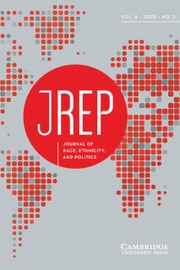In the current context of democratic backsliding in some advanced democracies around the world, Citizenship in Hard Times is a timely and relevant contribution to the study of the role partisanship plays in addressing or confounding these developments. Specifically, Sara W. Goodman explores the effect of democratic threat on citizenship norms in three liberal democratic countries, namely the United States (US), the United Kingdom (UK), and Germany, based on an original survey fielded in the summer of 2019 (as well as existing International Social Survey Programme data from 2004 and 2019).
Her analysis centers around citizenship as a foundation of democratic stability (Chapter 2), which can turn into a potential source of instability if “citizens respond to democratic threat not as citizens but as partisans” (p. 29; emphasis in original). To illustrate this, Goodman’s strategy is twofold: first, she investigates how citizenship norms (defined and measured in Chapter 3) differ according to partisanship (Chapter 4). To that end, based on 14 items of citizenship attributes—a combination of established and novel— she identifies three factors of citizenship norms (behavior, liberal beliefs, and national belonging), which guide her analyses. Left and right political parties and their voters differ concerning their perceptions of items of national belonging, for example supporters of right parties place an emphasis on aspects such as speaking the language or feeling American/British/German. However, Goodman also finds an overlap between left and right on liberal democratic beliefs and behavior, which suggests a strong common ground in “normal” times.
In a second step, she studies if and how these norms are adapted in response to exposure to two vignette experiments that speak to different types of threats: polarization (Chapter 5), a threat that citizens can do something about, and foreign interference in elections (Chapter 6), which is beyond the individual citizen’s control. In the case of polarization, where the treatment is adapted to the respective country context (US: partisan polarization; UK: Brexit; Germany: potential breakdown of social cohesion), Goodman finds that citizenship norms are adapted according to partisan incentives as well as opinion-based or status cleavages in line with the respective polarization treatments. That is, in the US and UK left partisan challengers (Democrats and Remainers) are more likely to support liberal norms and close supervision of the government, though with an illiberal tendency regarding national belonging in the UK. In Germany, voters of parties which are members of the government coalition (both mainstream left and right) valued vigilance and patience.
In the case of foreign interference in elections, Goodman uncovers similar patterns. That is, partisanship and position of power after the latest election shape which citizenship norms are put to the fore. While incumbents react with impatience and demobilization, losers or challengers respond by underlining the importance of vigilance, watching the government, and informed and active citizenship attributes. This means, as Goodman rightly points out, citizens understand differences between democratic threats and adapt their responses according to their partisan identity, which in turn can exacerbate the issue.
To make sense of these findings, Goodman advances the concept of positional incentives, whereby citizens adapt their perceptions of citizenship norms according to the position of the party they support, that is, if they are in office or not. Further, she underlines the importance of the institutional context: in majoritarian or Westminster systems, institutional incentives facilitate polarized responses, while consensus systems allow for less divisive approaches to politics as, for example, collaboration across party lines is more common (see the German case).
Goodman’s decision to choose “precision over parsimony” (p. 81) in her analyses allows her to paint a nuanced picture of how citizenship norms play out across the three countries. Her clearly structured discussion guides the reader step-by-step and manages to accessibly present her findings without unnecessary complexity. Furthermore, while she convincingly draws out commonalities among the three case studies, the differences between particularly the US and the UK on the one hand and Germany on the other show her decision for nuance was warranted. Here, one note could be made about the case selection, as results from a second consensus-based democracy, such as Switzerland, would have potentially allowed Goodman to strengthen her point about the institutional context.
Overall Citizenship in Hard Times is an important contribution to the study of democracy in times of various threats, particularly the pitfalls of partisanship (see, e.g., Armaly and Enders, Reference Armaly and Enders2023, on how it influences perceptions of rights and liberties; or Krishnarajan, Reference Krishnarajan2022, on how it influences evaluations of (un-)democratic behavior). Addressing these is in no way an easy feat. As Goodman rightly points out, part of the problem is facilitated by certain institutional contexts and not so much due to an uninformed citizenry (as they adapt their response to the threat at hand) but rather a lack of will to engage “across the divide.” As a first aid remedy, Goodman suggests civic education that unites citizens behind liberal democracy and encourages the (re-)establishment of common goals. While this may not be the whole answer, it presents a logical first step to counter recent developments.
Competing interests
The author declares none.


